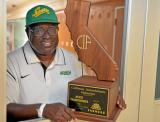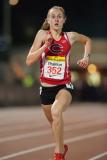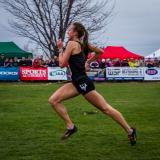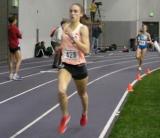Folders |
WIAA amends rule book in favor of HS runners and other individual athletes - 2014 DyeStatPublished by
WIAA amends its rule book with 'Alexa Efraimson Rule'
By Doug Binder, DyeStat Editor The state association rule in Washington that caused Alexa Efraimson to lose her eligibility for several weeks of the 2013 cross country season has been changed. Efraimson's father, Dan, working with the Camas (Wash.) superintendent Mike Nerland, worked to change the wording of a Washington Interscholastic Activities Association rule that prohibited high school athletes from competing in scored college meets or against professional athletes. Amendment 18.23.0 allows high school students to compete unattached against pro and college athletes in the sports of bowling, cross country, golf, gymnastics, swimming, tennis, track and field and wrestling.
ALEXA EFRAIMSON DISCUSSES RULE CHANGE The Efraimsons opposed the rule because they said it denied opportunities for competition for growth and development. Dan Efraimson contacted the Camas athletic director and superintendent to ask for some guidance for how to get the rule changed. "I asked the question 'How do we change this?'" Efraimson said. "It may not be effective for (Alexa), but at least make it that it's not a limitation any more. It's unfortunate that there's not a level playing field for all these kids (across the country)." Efraimson found out the process included filling out a form, proposing the rule change, and getting a handful of other members schools to agree with it. From there, Nerland brought it to the WIAA board for discussion. Dan Efraimson submitted language for the amendment simply by cutting and pasting a line he found in the Colorado state association rules and then adding a minor tweak. Colorado was the state that Efraimson looked to first because it was obvious over the past year that Elise Cranny had no problem competing unattached in college meets that were willing to accept open entries. Cranny, for instance, ran at the Payton Jordan Invitational at Stanford, Calif. on Sunday and used the opportunity to run against college and pro athletes to clock the fastest 1,500 meters by any U.S. high school athlete besides Mary Cain. Cranny also ran in that meet in 2013. According to the Vancouver, Wash. newspaper, The Columbian, WIAA executive director Mike Colbrese admitted this new ruling came out of concerns regarding cross country and track and field athletes. "I think what the membership is saying is we don't want to see teams playing against college teams or professionals," Colbrese said. "But also they didn't want to see ... that a student who runs in Bloomsday or any other kind of running event would have to check the entire roster of participants to find out whether any of those other participants might be a collegiate athletes or even a professional athlete." As the rule was previously worded, Alexa Efraimson was likely in violation of it on more than one occasion last spring. But it was her participation in the Bill Dellinger Invitational in Eugene, Ore. in October -- where Efraimson ran to a stunning victory over Boise State All-American Emma Bates and other collegians -- that led to flags being raised and her eligibility suspended.
At the time, Colbrese said this about the Efraimson case: "The WIAA rules state that when a high school athlete competes in a meet against college athletes who are representing their schools in a scored meet, that violates our amateur status for the high school athlete." After two weeks, and a meeting between Dan Efraimson and a WIAA official, Alexa was reinstated through an appeals process. She went on to qualify and then win the Washington state championship, and ultimately, Nike Cross Nationals. Subsequently, she was named Gatorade Cross Country Girls Athlete of the Year. After the cross country season concluded, the WIAA lifted the rule to give it more consideration. That allowed Efraimson to compete in an open race at the University of Washington in January, where she ran an all-time U.S. best 9:00.16 in a 3,000-meter race. And then, Efraimson went to the Millrose Games and ran alongside professionals in the Wanamaker Women's Mile, running 4:32.15. The Columbian suggested that the new amendment -- one of six overall that have been adopted by the WIAA -- might be dubbed "The Alexa Efraimson Rule." The issue, Dan Efraimson contends, is larger. "Everybody should have the same rules," he said. "How would you ever get to the point where you get all states on the same playing field? You have the definition of what's an amateur athlete different from state to state, you have the number of meets that schools can be at different from state to state. "It's unfortunate that you have these different states that are hindering athletes in different ways." But this week's news felt like a win. The Efraimsons got involved to fix a problem they saw in the WIAA rulebook and the process worked. "Honestly it makes me really happy," Alexa Efraimson said. "This (new rule) will let me still be able to run with my team but also get the competition that I need without being deemed ineligible. It will help with my development, not just as a high school athlete but as a runner in general." The new rule won't go into effect until Aug. 1. In the meantime, Dan Efraimson said there were a few meets on the calendar before then where they would ask for a waiver to allow Alexa to compete against other runners of her ability level. More news |











